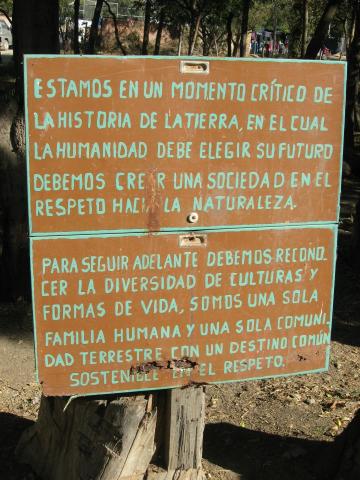
This week's reflection was written by Maryknoll Father Ray Finch in 2016. Father Finch lived and worked in the Andean regions of Latin America for many years, and is currently Superior General of the Maryknoll Fathers and Brothers.
I am about to do a new thing; now it springs forth, do you not perceive it?
In Western Culture we speak of the future as being in front of us, we “look forward toward the future.” The Aymara in the South American Andes understand the future as something which is behind us, something which is not seen, that we approach slowly and with caution because we are not yet in contact with it or able to perceive it. The future is so new that we cannot even imagine it, and we can easily miss the signs, the first buds of that future. They also speak of the future in terms of a “Pachakuti,” turning the world, turning reality and history upside down.
In the first reading God speaks of creating the future, of creating something new, something so different that we are called to let go of the past. As in so many other parts of the Scriptures, God speaks of the New Creation, of a new heaven and a new earth the construction of which has already begun; do you not perceive it?
The Aymara would say that we see the past; we know it deep in our bones. We tend to be more connected to the past than we realize, sometimes we actually get stuck in the past. It is important to learn from the past, to perceive the things that have given us life, those things that have enabled us to flourish, as well as those things that have diminished our capacity for life and love. At the same time we need to avoid getting stuck in the past, constantly reliving either the hurts or the happiness of yesterday.
The second reading makes it clear that the something new, the something different, the new creation is Jesus. Paul says, “I regard everything as loss because of the surpassing value of knowing Christ Jesus my Lord.” In Jesus, God is turning history upside down; God is “doing something new.” The question is, are we able to see, to perceive, the new creation that God is bringing about in our midst.
Today’s Gospel is about that new creation that God is bringing about. When I read the account of the woman caught in adultery, I am always impressed at the serenity and forgiveness that exudes from Jesus. He is being attacked by the Pharisees and scribes; they are attempting to hold Jesus in a past that excludes possibilities of forgiveness and change, a past that clearly defines the fate of the sinner, in this case the woman caught in adultery. Jesus refuses to be defined by the past and opens up new worlds, new paths for all, for the sinner as well as for the Pharisees, for the scribes and for each one of us. The message of today’s Gospel is clearly about forgiveness but even more so it is about turning the world upside down, about the new creation where we all have the possibility of being freed from our past, from our errors, from our chains, from the reality that we have lived for so long, from being caught in adultery, whatever that might be for each one of us.
Lent is a time that enables us to perceive the new creation that God is bringing about in each of us and in our world, it helps open our eyes and hearts to the Spirit turning the world upside down. In the Gospel Jesus sees a person, a woman, trapped in her past. He sees beyond the sin, beyond the rules of society to a new, different person and future. The scribes and Pharisees see only what has been and the rules that “must” be fulfilled. They cannot see beyond what is, to what might be, to the new creation.
As we prepare to celebrate Holy Week, the passage from death and darkness to life and light, the passage from what is to what could be, what do we see when we look at the face of the “woman caught in adultery.” Do we see beyond the errors, the past and present deformities, to what could be or are we stuck in what was and what is. Do we perceive the new that God is creating in each one of us and in our societies or can we only perceive the pain and the restrictions that hold us in the past. In today’s Gospel the woman caught in adultery goes on to new life, to sin no more, to new possibilities, while the Pharisees and scribes just walk away because they cannot perceive the new reality that God is creating. May this holy time of preparation enable us to see God creating new life in our midst, may this be a time of opening our hearts and minds to the future that is already begun.
